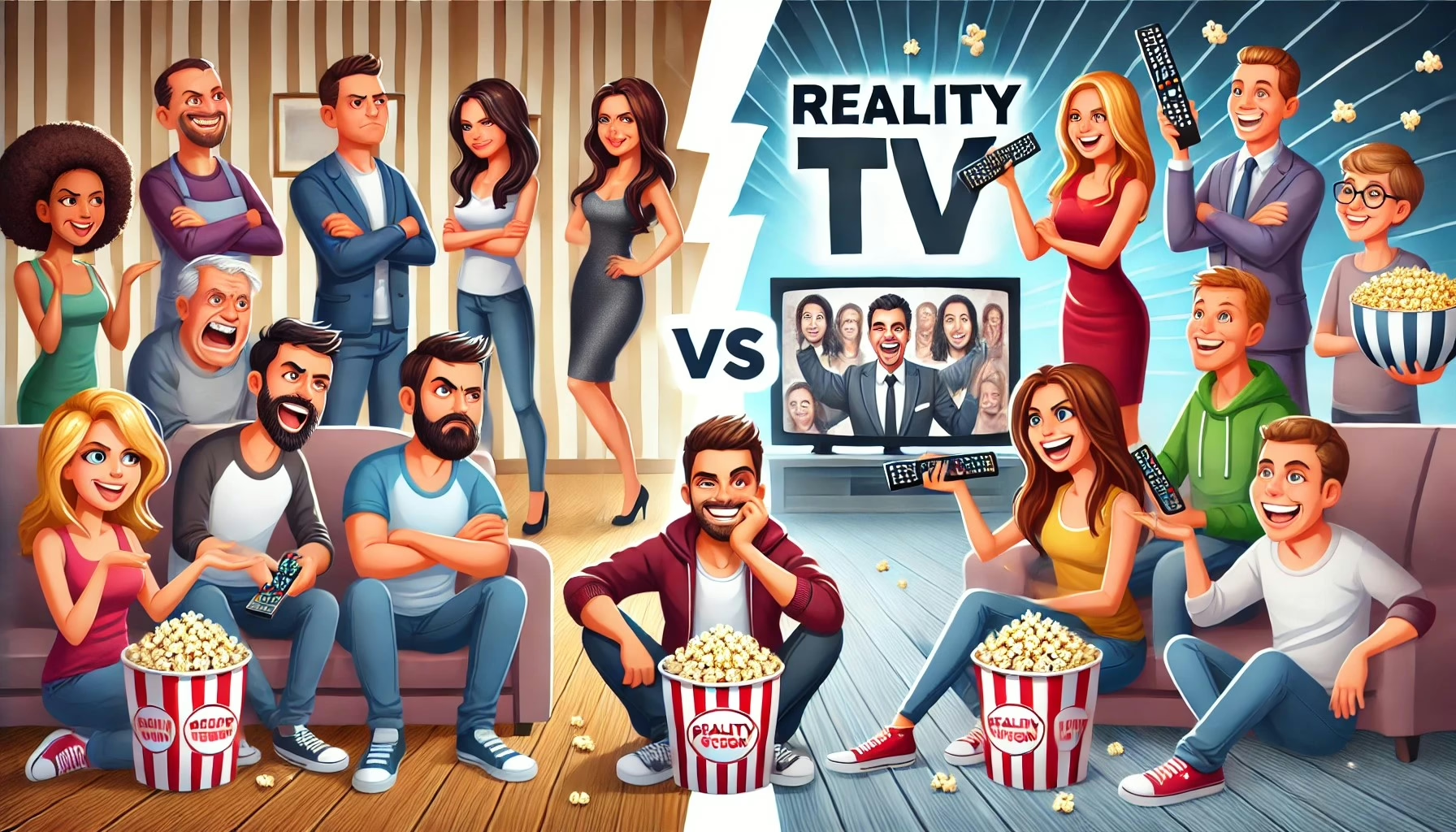When it comes to humanity’s greatest mistakes, there are some pretty obvious contenders: wars, environmental destruction, Brexit… But let’s dive into a more controversial decision that isn’t universally condemned. Brace yourselves, dear readers, because today we’re talking about… Reality TV.
Yes, you read that right. The omnipresent genre that has infiltrated our screens, our conversations, and our culture. Reality TV, with its endless parade of eccentric characters, manufactured drama, and questionable morals, was sold to us as a fresh form of entertainment. But has it really enriched our lives, or has it been a colossal cultural misstep? Let’s break it down and see if you agree that reality TV might just be one of humanity’s greatest blunders.
The Origin Story
Reality TV as we know it exploded in the early 2000s with shows like “Big Brother,” “Survivor,” and “Pop Idol.” The UK embraced this trend wholeheartedly, and soon we had “The X Factor,” “I’m a Celebrity… Get Me Out of Here!,” and “Love Island” dominating the airwaves. The premise was simple: take ordinary (or not so ordinary) people, put them in extraordinary situations, and watch the sparks fly.
The Fame Factory
One of the main draws of reality TV is the promise of instant fame. Contestants become overnight celebrities, their every move scrutinised and celebrated by the public. But this fame is often fleeting, and the pressure can be immense. Many former reality TV stars have spoken out about the toll it takes on their mental health, with some tragically succumbing to the pressures.
Question: Have you ever wondered what happens to reality TV stars after their 15 minutes of fame are over? Do you think the quest for instant fame is worth the potential mental health risks?
Manufactured Drama
Let’s not kid ourselves: reality TV is far from real. Producers manipulate situations, edit footage to create narratives, and encourage contestants to act out for the cameras. This manufactured drama can be entertaining, sure, but it also promotes a distorted view of reality. Conflict is exaggerated, superficiality is celebrated, and genuine human emotions are often turned into spectacles.
Question: Do you think the manufactured drama of reality TV reflects or distorts our society? Have you ever found yourself questioning the authenticity of what you see on these shows?
Impact on Society
Reality TV has a significant impact on society, particularly on young viewers. Shows like “Love Island” often promote unrealistic body standards, materialism, and unhealthy relationships. The obsession with appearance and status can lead to issues like low self-esteem, body dysmorphia, and even depression.
The impact extends beyond individuals. Reality TV has changed the way we interact with each other, normalising behaviour that would once have been considered unacceptable. Public shaming, backstabbing, and relentless self-promotion are now part of the cultural fabric.
Question: How do you think reality TV has influenced societal values and behaviours? Do you see these changes as positive or negative?
The Jeremy Kyle Show Controversy
One of the most contentious reality TV shows in the UK was “The Jeremy Kyle Show.” Airing from 2005 until its abrupt cancellation in 2019, the show became infamous for its confrontational style and its exploitation of vulnerable guests. The format involved guests airing their personal issues in front of a live audience, often leading to heated confrontations and public shaming.
The show was cancelled after a guest tragically took his own life following his appearance. This incident sparked widespread criticism and raised serious questions about the ethics of reality TV. Critics argued that the show exploited individuals’ vulnerabilities for entertainment and that the aftercare provided was insufficient.
Question: Do you think shows like “The Jeremy Kyle Show” should have stricter regulations to protect participants? How do you feel about the show’s impact on public perception of mental health and personal issues?
The Cultural Zeitgeist
Reality TV has become a cultural phenomenon. Iconic moments from these shows enter the public consciousness and become part of our shared experiences. Catchphrases, memes, and even fashion trends are born from reality TV. While this can be fun and engaging, it also begs the question: is this really the cultural legacy we want to leave behind?
Question: Can you think of any iconic reality TV moments that have shaped popular culture? Do you view these moments as a sign of cultural progress or decline?
The Ethics of Exploitation
Reality TV often walks a fine line between entertainment and exploitation. Contestants are frequently put in stressful and humiliating situations for the sake of viewer ratings. Some shows have faced backlash for the way they treat participants, with accusations of emotional manipulation and inadequate support.
Question: Do you think reality TV exploits its contestants for entertainment value? Should there be stricter regulations to protect participants?
Impact on Education and Research
One area that’s often overlooked in the reality TV debate is the impact on education and research. The UK has traditionally been a leader in academia and scientific research, thanks in part to funding and collaboration within the EU. Reality TV’s focus on instant fame and superficial success can detract from the value placed on education and intellectual achievement.
UK universities have reported a drop in EU student applications, and British researchers now face barriers to participating in EU-funded projects. The potential loss of talent and innovation is a significant concern for the future of the UK’s academic and scientific community.
Question: How important do you think international collaboration and funding are for education and research? Have you or anyone you know been directly affected by these changes?
Cultural Consequences
The cultural impact of reality TV is significant. The freedom to live, work, and travel across Europe was a cherished benefit for many Brits. The loss of this freedom has been a bitter pill to swallow, particularly for younger generations who feel their future opportunities have been curtailed.
Moreover, the sense of belonging to a broader European community has been fractured. Many feel a sense of isolation and a loss of identity as Europeans. The cultural exchange, which enriched lives and broadened perspectives, has been diminished.
Question: Do you feel a sense of loss regarding the freedom to move and work within the EU? How has reality TV affected your personal sense of identity and belonging?
Environmental Policies
Reality TV also has implications for environmental policies. The EU has been a driving force behind many of the UK’s environmental regulations. With Brexit, there’s a risk that the UK might weaken these standards, prioritising economic growth over environmental protection.
On the flip side, some argue that Brexit allows the UK to tailor its own environmental policies to better suit national needs. However, the challenge lies in balancing economic interests with the urgent need to address climate change and environmental degradation.
Question: Do you trust the UK government to maintain or improve environmental standards post-Brexit? How do you think reality TV will impact the UK’s ability to tackle climate change?
Alternatives to Reality TV
While reality TV continues to dominate, there’s a growing appetite for more meaningful and enriching content. Documentaries, educational programmes, and scripted dramas offer alternative forms of entertainment that can inform and inspire. The rise of streaming platforms has made it easier to access a diverse range of content, giving viewers more choices than ever before.
Question: Do you find yourself seeking out alternatives to reality TV? What types of programmes do you think offer more value and enrichment?
The Future
So, what’s next for reality TV? Despite the criticisms, the genre shows no signs of fading away. New formats and shows continue to emerge, capturing the public’s attention. However, there’s also a growing awareness of the potential harms and a push for more responsible production practices.
Question: Do you think reality TV will evolve to become more ethical and authentic, or will it continue to prioritise sensationalism and ratings? How do you envision the future of entertainment?
The Human Element
At the heart of the reality TV debate are the people whose lives have been profoundly affected. From businesses struggling to stay afloat to families divided by differing opinions, the human element is often overshadowed by political rhetoric. Personal stories of loss, frustration, hope, and resilience paint a more nuanced picture of reality TV’s impact.
Question: How has reality TV personally affected you or those around you? What stories do you have to share about the human side of reality TV?
Engaging the Debate
Reality TV was a bold, controversial experiment that has left a lasting mark on our culture. It’s a topic that continues to spark lively debates, and opinions are deeply divided. So, what do you think? Was reality TV a well-meaning attempt to democratise fame and provide entertainment, or is it a monumental mistake that we will regret for generations?
Let me know your thoughts in the comments below! Do you agree that reality TV is one of humanity’s greatest mistakes, or do you think it’s a guilty pleasure worth keeping?
Feel free to engage and share your experiences, because who doesn’t love a good controversy?











